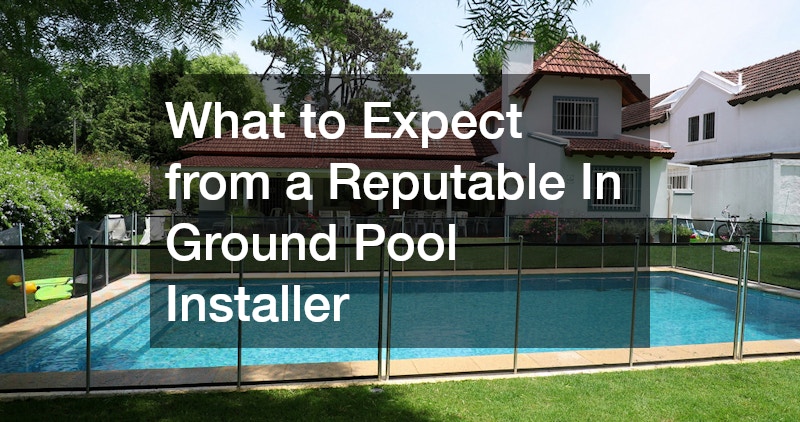Engaging a reputable in ground pool installer is a significant step in ensuring that your pool project is a success. In this article, we explore the various expectations and considerations involved in choosing the right pool installer.
How to Identify a Professional In Ground Pool Installer
Check for Licenses and Certifications
One of the first steps in evaluating a pool installer is to verify their licenses and certifications. This not only ensures they are legally permitted to work but also confirms their knowledge of industry standards.
Licenses and certifications are indicators of an installer who has undergone the necessary training. They are a testament to their ability to perform the job according to local regulations and industry norms.
Additionally, certified installers are usually updated with the latest safety protocols and techniques. This ensures that your pool is installed with the utmost consideration for quality and safety.
Your Research Matters: Read Customer Reviews
Reading customer reviews and testimonials is invaluable in identifying a reliable pool installer. Often, past clients provide insights into the installer’s reliability, quality of work, and customer service.
Look for patterns in customer feedback that can indicate consistent performance or recurring issues. Consistently positive reviews can reassure you of the installer’s professionalism and skill.
However, it’s important to approach testimonials with a critical eye. Balance glowing reviews with those that provide constructive feedback to get a comprehensive view of the installer’s capabilities.
What Should Be Included in the Installation Contract
Key Components of the Contract
A comprehensive installation contract is crucial to safeguarding your investment. Essential elements of the contract should include clear timelines, costs, and detailed descriptions of materials.
Both parties should agree on the payment schedule, outlining when and how payments will be made. Clarity in these areas helps prevent disputes and ensures transparency throughout the project.
Additionally, the contract should specify responsibilities and tasks during the installation. This documentation holds the installer accountable and provides you with peace of mind.
Understanding Warranty and Maintenance Clauses
The warranty terms in your contract are equally important as they protect against potential defects or issues post-installation. Understanding the duration and conditions of warranties offered can save significant costs down the line.
Maintenance clauses should clearly outline what is covered in terms of ongoing care and repair. Ensure the contract specifies what maintenance services are included and any associated costs.
Determining your installer’s obligations during the warranty period can help in efficiently resolving any issues. This foresight ensures that your pool remains in peak condition for years to come.
How Long Does the Pool Installation Process Take?
Typical Timeline for In Ground Pool Installation
The process of installing an inground pool involves several stages, each requiring careful planning and execution. Initially, site preparation and excavation are conducted to lay the groundwork.
After excavation, the pool structure is constructed, followed by the installation of plumbing and electrical systems. Each stage has its own duration, contributing to the total installation time usually spanning several weeks.
Finally, finishing touches such as decking and landscaping complete the process. The entire timeline can span anywhere from a few weeks to a few months, depending on the complexity of the design.
Factors That Can Affect the Installation Timeline
Several factors can influence the duration of pool installation, with weather being a primary concern. Inclement weather can delay excavation and construction, extending the project timeline.
Design complexity also plays a significant role; more intricate designs require additional time to ensure precision and quality. Therefore, discussing potential delays with your installer can prepare you for unforeseen challenges.
Additionally, obtaining necessary permits from local authorities can impact your schedule. Ensuring all paperwork is completed promptly can help mitigate bureaucratic delays.
What Safety and Quality Standards Should Be Met?
Safety Standards for In Ground Pools
Installing a pool involves adhering to stringent safety standards to secure a safe swimming environment. These include proper fencing, anti-slip surfaces, and compliant drain covers.
Local regulations often dictate essential safety measures to prevent accidents and ensure compliance. A reputable installer will follow these guidelines, offering peace of mind to homeowners.
Safety extends beyond installation to daily maintenance, involving regular inspections and checks. Keeping the pool area secure is crucial for preventing injuries and liabilities.
Quality Assurance and Post-Installation Checks
Quality assurance checks are vital following the completion of your pool installation. These inspections verify that all components function correctly and meet the agreed-upon standards.
Post-installation, clients should inspect the build and report any discrepancies to the installer immediately. Addressing issues promptly can prevent long-term problems and maintain quality.
Monitoring the pool’s functionality and environmental impact is part of continued quality assurance. This vigilance extends the pool’s lifespan and keeps maintenance costs manageable.
Choosing the right in ground pool installer involves understanding their qualifications, ensuring comprehensive contract terms, and knowing what to expect during the installation process. By prioritizing safety and quality, homeowners can enjoy the luxury and leisure of a well-installed pool.

